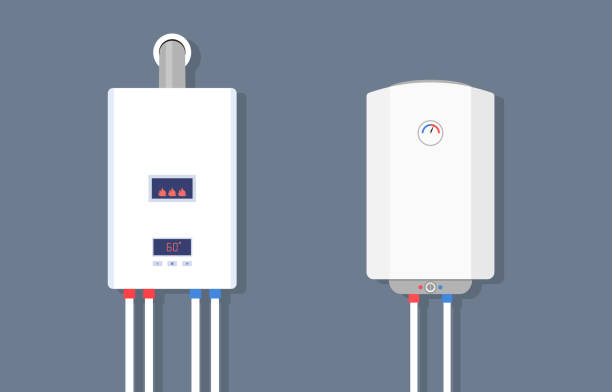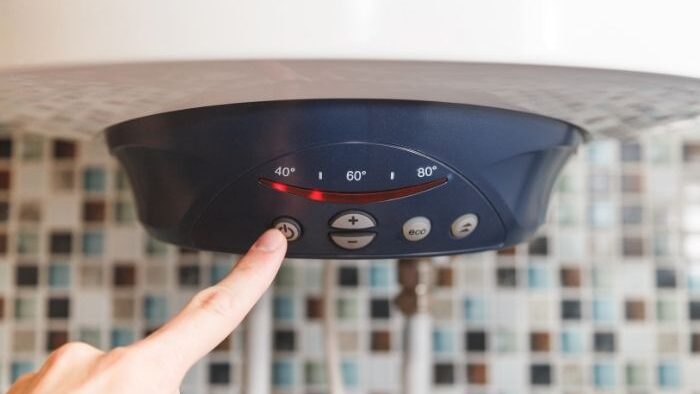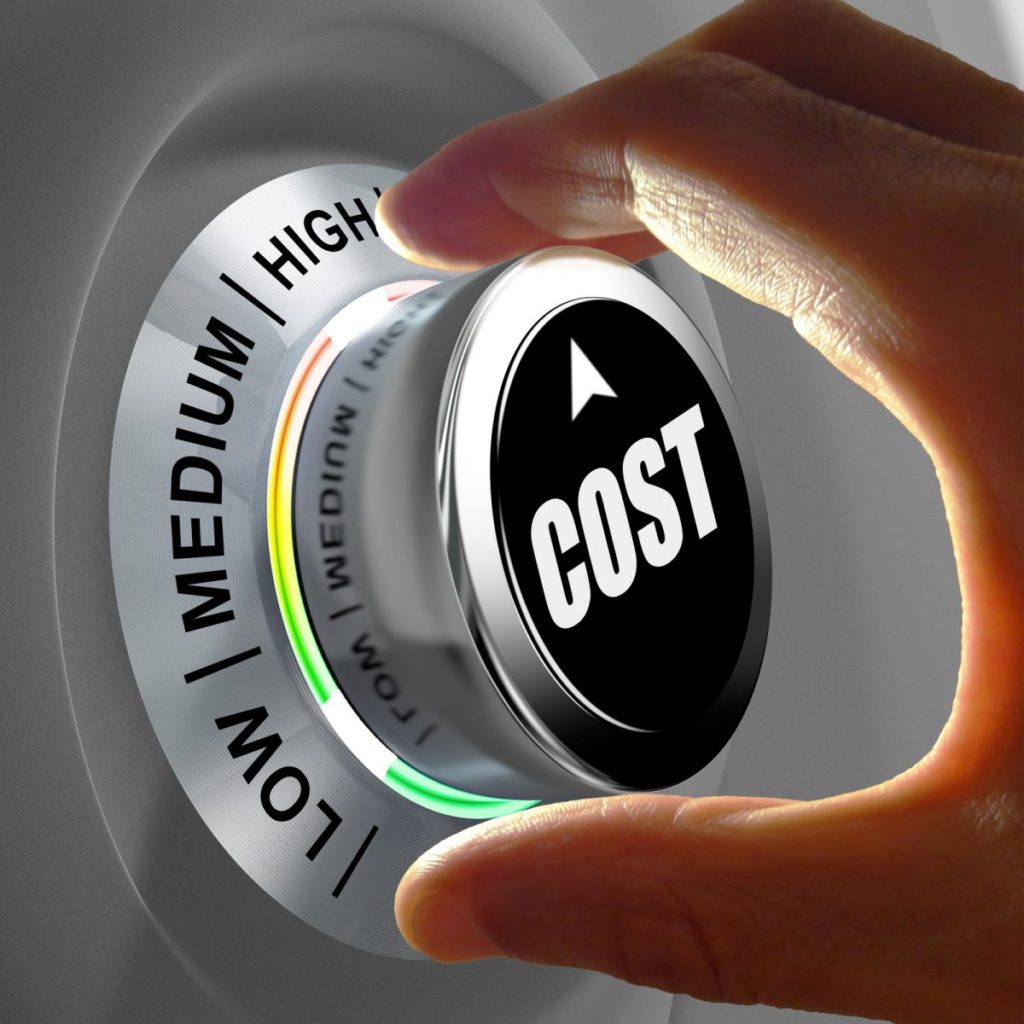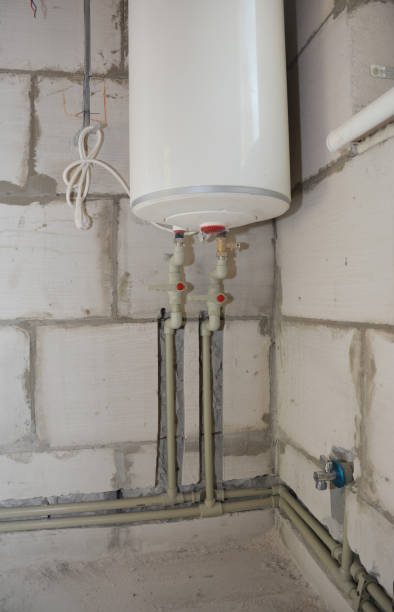When it comes to hot water heating, homeowners have a few options to choose from. Two of the most popular systems are gas vs electric. Both have their own advantages and disadvantages, so it’s important to consider which one is the best fit for your home.
Gas vs Electric: Which Is Efficient?
Both gas and electric hot water heating systems have their own advantages and disadvantages, and it’s important to consider which one is the best fit for your home. Climate, budget, and the size of your home are all important factors to consider when choosing a hot water heating system.

Benefits of gas hot water heating systems
Gas hot water heating systems use natural gas or Liquid Petroleum Gas (LPG) as the fuel source, which is often cheaper than electricity. This makes them a cost-effective option for many homeowners.
Additionally, gas systems tend to have a faster recovery rate, which means they can heat water more quickly. This can be especially beneficial in larger homes or homes with multiple bathrooms.
Benefits of electric hot water heating systems
On the other hand, electric hot water heating systems are known for their reliability and low maintenance. There are no flammable fuels involved, which eliminates the risk of fire or gas leaks. Additionally, electric systems tend to have a longer lifespan than gas systems.

Best Hot Water Systems for Hot or Cold Climates
When it comes to cold climates, both gas and electric systems can be effective. Gas systems tend to work well in colder climates, as they can heat water faster. Electric systems, on the other hand, may be a better choice for homes in warm climates, as they don’t produce heat as a by-product of operation.
Additionally, in hot climates, the demand for hot water is low and the system may not be used as frequently, which means it may not be necessary to invest in a high-efficiency gas system. An electric system may be sufficient for the needs of the household.
Efficiency Comparison
Gas hot water heating systems are often the most efficient choice for homeowners. Gas hot water heaters are designed to heat water faster than electric systems, allowing homeowners to use less energy and save money on their energy bills.
Additionally, gas hot water systems can be more energy efficient than electric systems when properly maintained and serviced. Electric hot water heating systems are also an efficient choice for homeowners.
Electric systems are less expensive to purchase and maintain, and they are also more energy efficient than gas systems when used at lower settings. They are also easier to install and maintain since no additional ventilation is required, making them a great choice for those who want to save money on their energy bills.
Control Options
Gas hot water heating systems tend to have more control options than electric systems. Gas systems often have a thermostat that can be set to a specific temperature, and they may also have a timer that allows you to set specific times for the hot water to be heated. This can be useful for homes where hot water usage is scheduled, like in a hotel or a hostel.
Electric systems, on the other hand, tend to have less control options. They may have a simple on/off switch or a thermostat, but they often lack the scheduling options that gas systems offer, although they are becoming more programmable now.
Cost Comparison
Gas hot water heating systems tend to be more cost-effective than electric systems, as natural gas is often cheaper than electricity. This can result in lower energy bills for homeowners. Additionally, gas systems tend to have a longer lifespan than electric systems, which can save homeowners money in the long run.
On the other hand, electric hot water heating systems are known for their reliability and low maintenance. They may have a higher initial cost, but they have fewer moving parts, which means they are less likely to break down and require repairs.

Making the switch from gas to electric heating
Making the switch from gas to electric hot water, or vice versa, is an important decision for any home or business. There are several cost benefits, efficiency, control options and convenience factors that should be taken into consideration when making the decision.
When it comes to cost benefits, electric hot water systems tend to be more cost-effective than gas systems for small houses or households. This is due to electric systems having less maintenance and operating costs, as well as generating lower energy bills.
On the other hand, gas hot water systems are better for larger households or businesses as they tend to be more efficient and may be more cost-effective in the long run. In terms of efficiency, electric hot water systems are more energy-efficient than gas systems, but the costs per unit of energy is more expensive for electric than gas.
Electric hot water systems can be easily integrated into smart home technology, providing users with even more control and convenience.
Switching from electric to gas heating can be a cost-effective option, as natural gas is often cheaper than electricity. Gas systems tend to have a faster recovery rate, which means they can heat water more quickly. This can be especially beneficial in larger homes or homes with multiple bathrooms.
However, switching from electric to gas heating can require additional infrastructure and installation cost. Gas systems require connection to mains gas to be run to the home, which can be expensive. Additionally, gas systems tend to require more maintenance than electric systems, which can result in higher costs over time.
Tankless water heaters

Tankless water heaters, also known as on-demand or instant water heaters, are a type of hot water heating system that heat water as it flows through the unit, rather than storing it in a tank. This can provide several benefits to homeowners.
One of the main benefits of tankless water heaters is their efficiency. Because they heat water on demand, they don’t have to constantly keep a tank of water hot, which can result in energy savings. Additionally, tankless water heaters have a longer lifespan than traditional tank-style water heaters, which can save homeowners money in the long run.
Another benefit of tankless water heaters is their space-saving design. Because they don’t require a storage tank, they can be installed in smaller spaces, such as closets or attics, which can free up valuable floor space in the home.
Tankless water heaters are available in both gas and electric models, and both have their own advantages and disadvantages. Gas-powered tankless water heaters tend to have a faster recovery rate, which means they can heat water more quickly. Electric tankless water heaters, on the other hand, are known for their reliability and low maintenance.
However, tankless water heaters can have a higher initial cost than traditional tank-style water heaters, and they may require additional installation costs, such as upgrading gas or electric service. Additionally, they may not be the best fit for large households or homes with high hot water demand.
Read related articles:
- Combi Boilers vs Conventional Boilers: Which is Better for Your Home?
- What Size Electric Boiler Do I Need? Compare For Your Home
- Electric vs Gas Combi Boiler: Which One is Right for Your Home?
*The information in this article should be used for general guidance only. Full details are on the link in the footer to our disclaimer page. Always discuss your requirements with a competent and suitably qualified professional before undertaking any work.
